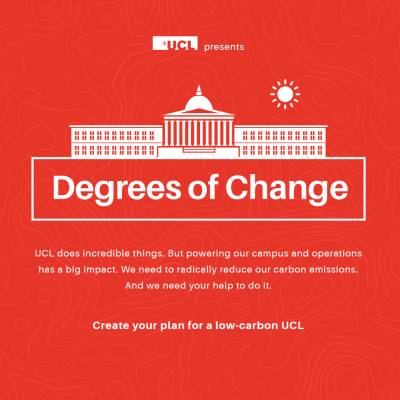UCL creates interactive tool to enable staff and students to tackle the university's carbon challenge
28 October 2015
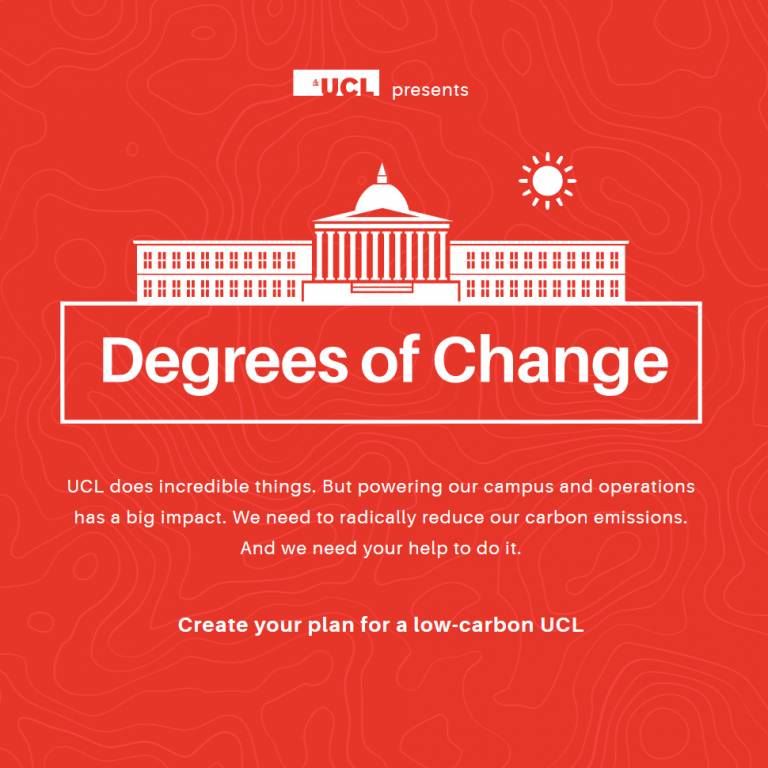
How would you spend £10m to reduce UCL's carbon emissions?
The
UCL Sustainability Team has created a new interactive online tool
that enables staff and students to 'spend' their budget (and generate the approximate carbon
savings) from the activities they think the university should prioritise. And their virtual carbon reduction plans will have a real-world impact, by helping inform a wider consultation into a new strategy for carbon reduction at UCL.
Building on research by Dr Tom Cohen from the UCL Transport Institute, the tool highlights the opportunities and trade-offs in improving the efficiency of the campus and supporting environmental behaviours from staff and students.
Create your own Degrees of Change plan
Find out more about UCL's proposed plan for carbon reduction and use the new tool. Below you can find comments from staff and students on how they developed their plans.
Create your own plan for a low-carbon UCL
We asked participants how they developed their plans...
"I tried to go for the best value for money. I was surprised at how cheap
and effective some of the community based options were, so maxed them
out. But I think we will only change their behaviour if our buildings
actually work properly, so I allocated the remainder of my budget to
more efficient lighting and temperature control"
- Dr Sarah Bell, Department of Civil, Environmental and Geomatic Engineering
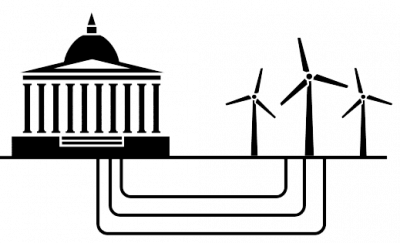
"I spent a lot of money on renewable energy, as I believe this to be a
key means to foster a global energy revolution. By investing more in
renewables, this sector can gain a competitive advantage and therefore
pressurise current fossil fuel industries to readjust their emission
heavy business conducts. Other than that one of my key priorities is
making the UCL campus more efficient. I have always been baffled by how
terribly un-insulated and energy insufficient our buildings are. My third
priority were green roofs. This derives less from the actual ensuing
CO2 savings, but more from the overall pleasant feeling I get in green
cities"
- Theresa Reisch, Chair - UCLU Green Economy Society

"I
think that by making a few high profile changes such as solar panels
and green roof gardens this would reap additional benefits by changing
people's mindsets towards sustainability as it is clear that UCL is
being proactive in reducing its carbon usage and hopefully people would
follow suit with their personal activities"
- Toby Skailes, BSc Human Sciences

"The things that are most obvious to me relate to the buildings themselves - the older buildings on the main campus are incredibly badly insulated and have period-style single-glazed sash windows, which means that the rooms are glacial and very drafty in the winter despite the heating being on full blast, and intolerably hot in the summer. Turning off lights and unnecessary systems at night seems to me to be an incredibly quick win. And since UCL takes part in a lot of research towards new ways of generating clean power, it seems silly not to buy more of our power from renewable sources!"
- Katie Grocott, UCL Publications and Marketing Services

"Climate
change is a major and urgent issue and we, as a community of a
world-leading education institution in the subject, must be all involved
in the solution of this problem. That is why I would suggest a very
high community effort and participation in this campaign. Although is
not very most cost-effective (especially in London), solar
panels have the property of being seen, and gives the feeling that
"something is being done", that is why I would include some solar panels
in my plan.
Another improvement that I would do in the campus (unfortunately it is
not among the options) is installing more water fountains, which would
reduce dramatically the amount of bottled-water purchased and the amount
of trash generated.
Despite flights are a huge pollutant, I wouldn't reduce them too much
because the participation of UCL's academics at international forums is a
fundamental part of UCL's recognition and prestige"
- Nicolas Daher, MSc Economics and Policy of Energy and the Environment

"Initially
installing some solar panels would be a good idea. The savings in
energy costs, albeit small, could be put into a CO2/energy saving fund
which could be later invested into carbon emission reduction projects at
UCL in the future. Although green roofs aren't very effective at reducing carbon emissions
compared to other activities, it would be essential for wildlife at a
time where habitats are continually being exploited and destroyed, in
particular the declining bee population. A green roof may be adapted to
provide a sanctuary for such declining wildlife"
- Gajaan Sabesan, MSc Nanotechnology and Regenerative Medicine
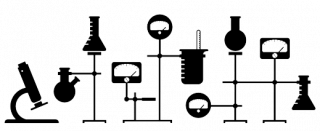
"I
think that UCL should focus on establishing culture of efficient energy
management by encouraging the all staff and students to get involved.
Through ensuring that departments share high energy use equipment, we
can reduce carbon emissions with relatively low monetary investment. In
addition to this, by installing more efficient lighting and encouraging
people to simply switch off appliances when not in use, there can be a
significant reduction in carbon emissions each year. We should think
from a long term perspective, hence installing renewable energy sources
such as solar panels is important"
- Ragav Manimaran, President - UCLU Entrepreneurs Society
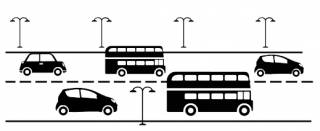
"I'm based in Holmbury St. Mary, middle of Surrey [Mullard Space Science Laboratory]. In the lab almost everyone comes by car. Many do carpooling, but still, you can count more than 80 cars. A simple shuttle service that comes at certain time in the morning and leave in the evening would improve the live of many in here. It would be less expense in petrol and the safety would be increased. Besides the carbon reduction this will make the place more attractive to new staff and students that would not need to buy a car to come to work"
- Dr David Perez-Suarez, Mullard Space Science Laboratory
- Create your own plan using Degrees of Change.
- Contact the Sustainability Team
- Find out more about the consultation and share more in-depth views
 Close
Close


